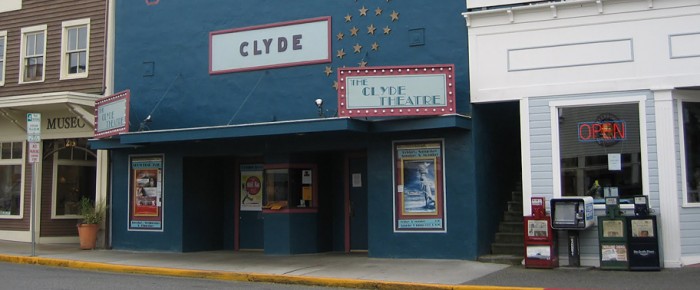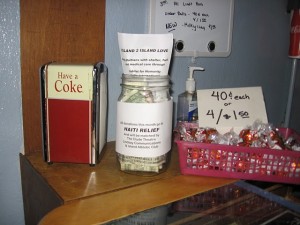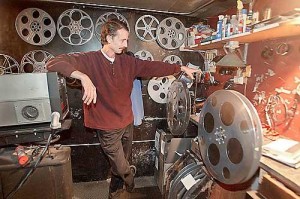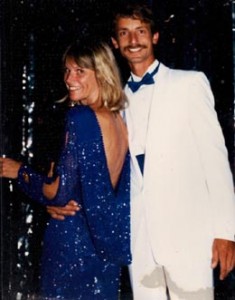
Backstage
Behind the scenes at The Clyde
Click the links above to discover more about what makes The Clyde tick behind the scenes. Meet your proprietors, learn more about our efforts to improve the South Whidbey community, and read stories about The Clyde from the local press.
Please check back in this section of the site soon, as we will be adding bios of our wonderful staff, many of whom have been with us for decades.

Over the years The Clyde has hosted many fund-raisers for local charities

The humble Magic Change Jar
In fact, there are those who say our motto should be “Sometimes it costs more to get out of The Clyde than to get in.” In 2004 through Operation Phone Home the theater and its patrons raised $16,000 in a month for the USO to provide phone cards for soldiers in Iraq and Afghanistan. In 2005 $10,500 was raised in one unforgettable night of music and film to help victims of Hurricane Katrina rebuild. In 2010 The Clyde partnered with the PTSA to collect 1,000 pair of athletic shoes for villagers in Africa, plus the money to ship them all.
Instead of a tip jar on the snackbar counter, we have the Magic Change Jar—money put in the old canning jar by Clyde patrons is matched by The Clyde, South Whidbey Assembly of God, Island Athletic Club, and Kevin and Mary Jane Lundgren, and usually provides about $7,000 for six local charities every year. In a special Magic Change Jar collection after the Haiti earthquake in 2010, $8,667 was raised for three relief agencies working in Haiti through donations to the Magic Change Jar and community matches.
One giant leap into the 21st century and a new generation takes the reins.
South Whidbey Record, 2012

Blake in the (pre-digital) projection booth (photo David Welton)
The Clyde Theatre family has a lot to celebrate this year.
That’s why the party has already started and will culminate with some community oriented festivities in September, for the theater’s official 75th anniversary.
But Blake Willeford, who has owned the little downtown Langley movie theater for 40 years, is also celebrating the fact that his back doesn’t hurt as much.
In December, the Clyde officially became an all-digital cinema house.
“We used to have to lift 60-pound reels up high and string them onto the projector,” Willeford said.
“We love digital. It’s so much easier and we like the challenge of learning something new,” he added.
Willeford refers to the team of he and his wife Lynn, originally his Sunday ticket seller whom he eventually married after buying the Clyde in 1972 from the original owners, Norman and Hazel Clyde. The Clydes built the historic movie house in 1937.
The Clyde Theatre, which holds an audience of about 250, certainly saw its share of changes over the years, including new interior and exterior color schemes; a stage built by didn’t-quit-his-day-job carpenter Blake on which local theater groups could perform; a seismic retrofit of the building in 1992; upgrades of sound and projection systems; and the installation of more comfortable seats in 2002.
But no change has been as dramatic as this new technology.
“I thought we had a good picture before, but now it’s just so much better,” Blake said.
“It’s rock solid. There’s no movement. Everything is in focus,” he said.
Now, instead of lugging huge film cans up and down the stairs, UPS delivers a hard drive containing all the films and previews. The Willefords simply load them onto the Dolby server and program them into sequence.
“I build the film on the computer including the lights going up or the lights going down; the lamp on the projector to start; the sound to start; and the lights to go to half for the previews and then all the way down when the film starts,” Blake said.
“I put it on a timer and it plays at 5 and 7:30, unless we want to hold it,” he said.
This efficiency allows Blake to join Lynn and the other staff downstairs to help with tickets, seating and concessions.
Gone are the hours of boredom in the booth keeping an eye on the projector, waiting for those memorable moments of panic for when things might go wrong. (One year, the reels got mixed up and Blake’s cousin projected “2001: A Space Odyssey” out of sequence. Nobody noticed.)
Digital projection allows for a bit of relaxation.
“We can actually get everybody into the theater and go out and eat dinner,” Lynn said.
“If there are enough people there to pay for it,” she added with a laugh.
They used to have to eat their Saturday dinner in the projection booth.
The Willefords’ adult son, Brook, who actually took his first steps down the Clyde’s center aisle, and who will inherit the business one day, remembers more nights than he can count when he slept on the floor of the projection booth or the balcony in his “Empire Strikes Back” sleeping bag.
“I loved the Clyde, and still do,” Brook said.
“Growing up in the Clyde instilled in me a love for cinema that still forms a huge part of my life — the stories I learned watching movies at the Clyde have helped me in my work as a writer for video games and advertising. I can’t imagine a better childhood for an aspiring writer,” he added.
It has always been a family affair for the Willefords at the Clyde.
Lynn Willeford lauds her husband for his vision of wanting to create a place of affordable entertainment for families, and even further, opening it up as a central spot for community events.
“Blake has done everything he could to make it a center for the community,” Lynn said.
“Sure, I helped make The Clyde what it is today too, starting in the mid-’70s, but he set the path we’ve been following ever since. That’s my guy!” she added.
The Willefords, too, have embraced generations of children in the community, watching them grow into the adult ticket.
“Part of what we take as our responsibility is teaching kids how to behave in public,” Blake said.
Through the years, there have been some squeaky wheels, but the Willefords said all it takes is a little show of positive attention to bring them around. They have genuinely loved watching kids grow up at the Clyde.
“Either we have gotten mellower, or kids are just politer now,” Blake said.
Brook, who capitalized on the skills he picked up at the Clyde, landed the best job on his college campus as the movie projectionist at the student union.
Still, he admitted that he and his best friend were probably the worst janitors his parents ever hired, and growing up in one of the town’s only entertainment hubs had its drawbacks.
“I’m pretty certain I was the last kid in my class to be allowed to get candy and pop from the snack bar, and you’d better believe that I couldn’t cause trouble at the theater, because my parents were the ones who would be cracking down if anything went wrong,” Brook said.
“And I’m not going to say that my parents owning the Clyde was the reason I didn’t date much in high school, but when one of the few places to take a girl on the South End is owned by your parents — and they’re liable to be there? Serious buzz kill,” he added.
In a few years, the projectionist torch (well, the Dolby server torch, anyway) will be passed to Brook, and the family is already talking about more changes, such as an idea for gaming events at the Clyde involving laptops, Xboxes and movie screen Wii matches.
Additionally, because every 75th anniversary deserves a diamond, the Willefords have already implemented the “Diamond Pix” matinees.
Each month through August, the Clyde shows a film from every decade from the 1930s through the 2000s on the fourth Saturday of the month. The price of the matinee screening reflects the price the Clyde charged during that decade.
Patrons can go online to vote for the films they want to see at www.theclyde.net. In January, audiences saw “Gone with the Wind” for 25 cents; and today at 2 p.m. “The Philadelphia Story,” will play for
50 cents per ticket. The 1950s pic voted in is “Singin’ in the Rain,” to be shown at 2 p.m., March 24 for 75 cents.
These celebratory months through September are all about the memories for the Willefords and they said they would like the final bash on Sept. 16 to be a dancing-in-the-street kind of community event.
“We want people to bring their own videos,” Lynn said, describing her idea for an all-day open house screening at the Clyde, where they will show folks’ personal videos.
“We want home videos — the winning basket in the game, the highlight of the play, baby pictures taken in the ’70s — any films they may have made over the years,” she added.
The celebration is already in gear for this family, and the Willefords are thankful that they were able to keep their independent movie theater going, unlike other small theaters, which may not be able to weather the expense of going digital, a change being forced by the film industry.
The question for Blake Willeford: After 40 years, are you ready to retire your hand at the Clyde and let Brook take over?
“He’ll have to pry it out of my cold, dead hands!” Blake said laughing.
For Brook’s part, he sees a few changes in store when he takes over, but nothing dramatic.
“I’m absolutely looking forward to taking over running the Clyde, whenever that happens,” Brook said.
“My parents have made the Clyde something that a community can hang their hat on. The island, in turn, has embraced the theater, and I don’t intend to change that one bit,” he said.
Check out these recent articles about The Clyde
The Clyde Theatre celebrates a community legacy
Celebrating digital and diamonds at The Clyde Theatre
The ‘FOOLS’ return in digital glory to The Clyde
Seventy-five years later The Clyde is still the picture of health
In Langley WA, Togetherness Comes One Citizen at a Time
Small-Town Movie House Raises Thousands for Troops
Langley’s Clyde Theatre Shows Films of Carlino
Hooray for Hollywood! KerbyFest Celebrates the Work of a Langley Resident
Blake Willeford bought The Clyde Theatre from Norm and Hazel Clyde in February of 1972, shortly after returning from three years with the Peace Corps in northern India. (and ever since has disconcerted Langley tourists in saris or salwar kameez by speaking to them in Hindi.) Lynn joined him in life and business in 1976.
In general Blake handles anything with three-dimensions, so ask him your questions about the building or equipment. Lynn handles the abstract—researching and booking films, doing the advertising, creating special events, and writing publicity and social-media content. They split the financial chores and what would in real businesses be referred to as HR.
No one at The Clyde works full-time, and some aren’t even paid. Blake was until recently a carpenter during the day, and Lynn still works as a freelance editor and writer. She is also a serial social entrepreneur, having founded Hearts & Hammers, Friends of Friends Medical Support Fund, and Fair University; co-founded the Back to School Program and Whidbey Island Local Lending; and been a founding member of WOW!Stories.
The six or seven part-time employees in the projection booth, the snack bar, and the cleaning closet run their own for-profit and nonprofit businesses during the day, or manage or act as support staff at local businesses. (You’ll see their profiles over the next year in blog posts.) They have all been with The Clyde for years, and in some cases for decades.
The same goes for the volunteers in the box office—one has been showing up every Thursday since 1983. Over the years our ticket sellers have included a mayor, a school board president, the heads of county departments, artists, and other varieties of small-town royalty. There has always been a waiting list for the job, which pays only in free admissions for your family, a pop and popcorn for yourself, and the sense of being part of something fun.
The Willefords’ copywriter son Brook acts as an advisor on matters from marketing to building upgrades. He will be joining them in the management of the theater in 2014.


